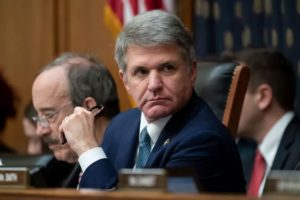China Task Force: Our democracy is not for sale

By Khosrow B. Semnani, Contributor and Amir Soltani. Deseret News.
Not all Americans embraced President Richard Nixon’s opening to China in 1972 as a triumph of American diplomacy.
With the backdrop of Chairman Mao Zedong’s Great Leap Forward, which triggered a famine that claimed over 30 million lives from 1958 to 1961, conservative columnist William F. Buckley warned about the dangers of normalizing Mao’s abomination — the Chinese Communist Party. His words are as prescient in 2020 as they were in Mao’s time.
Though Henry Kissinger and others have lauded 1972 — the Nixon in China moment — as one where America lost Vietnam but gained China, Buckley saw 1972 as an epic failure, a Chamberlain in Munich moment. Far from containing the horrors China’s revolution had unleashed upon its culture and civilization, the United States had become complicit in the Orwellian nightmare engulfing China.
Buckley lambasted Nixon’s embrace of Mao, a Communist big brother whose crimes surpassed Hitler and Stalin’s. The anti-communist Nixon’s foreign policy volte-face, he lamented, was as if the prosecutor at Nuremberg had suddenly embraced the Nazi defendants, “begging them to join with him in the making of a better world.”
Recently, House Minority Leader Kevin McCarthy announced the establishment of the China Task Force, headed by Congressman Michael McCaul, and which also includes two distinguished members of the Utah congressional delegation, Congressmen Chris Stewart and John Curtis. The Task Force’s specific focus will be to conduct probes and make recommendations to assess threats from China.
Indeed, with the rise of China and its many unfair trade practices, we face a defining moment every bit as crucial as 1972. The American people, and one might add, the Chinese people, have an opportunity to reexamine the cost of doing business, not with China — a Confucian civilization as old and glorious as any — but with the Chinese Communist Party.
The stakes could not be higher.
The spread of the coronavirus has not only exposed Americans to a pandemic but to Mao’s ghost: the bad habits of statism that continue to propel China’s Communist Party. And while millions of Americans justifiably protest the police killing of George Floyd at home, none of us can afford to ignore another impending tragedy: the Chinese police state’s chokehold on the people of Hong Kong.
Mao’s Cultural Revolution is far from over. And while some may be tempted to treat the crisis in Hong Kong, the future of Taiwan, the gutting of Tibet, the massacre at Tiananmen Square, and the “reeducation” of Muslim Uighur minority as China’s internal affair, the extension and expansion of China’s economic power in Asia, Australia, the Middle East, Africa and America is neither politically nor culturally benign.
To grasp the destruction wrought by China’s neocolonialism, look no further than the Islamic Republic of Iran. To avoid offending Beijing’s sensibilities, Iran allowed its shrine city of Qum to become the incubator that infected the entire Middle East with COVID-19. The pandemic exposed the conversion of Khamenei’s corrupt militia — the Islamic Revolutionary Guard Corp — into China’s trading partners. With its veto in the United Nations Security Council shielding Iran’s mullahs and their militias, it is actively promoting fundamentalism and financing terrorism to profit from the vacuum of American power — using the nuclear crisis and sanctions as a cover for draining Iran’s energy resources.
Such trade comes at a cost. China’s industrial enterprises practice a perverse form of state capitalism, one that drives captive states and nations into poverty and famine. Such predatory economic practices erode the stability and security of the international order, with China’s growth predicated on imbalance: shifting the costs of piracy, corruption, pollution and conflict onto the United States, the Iranian people and the international community.
None of us begrudge China’s rise out of famine, poverty, isolation and exhaustion. Nor do we seek to deny the people of China the benefit of trade and prosperity that hinge on peace and security. But not at any price. It is time that China start acting as a super power, not an opportunist rogue state.
No doubt, the House China Task Force has a herculean challenge ahead of them. And economic and national security issues should be carefully examined, including maintaining military competitiveness, protecting energy resources, safeguarding intellectual property and innovation, and America’s educational institutions. The magnitude of the historic moment is such that even Henry Kissinger, the architect of America’s China policy, is calling on the “world’s democracies” to “defend and sustain their Enlightenment values.”
It’s 2020, not 1972. The peril is great. The promise is even greater.
Khosrow B. Semnani is an Iranian American industrialist, community leader and philanthropist. He is the author of “Where is My Oil? Corruption in Iran’s Oil and Gas Sector.” Amir Soltani, a human rights activist, is the author of “Zahra’s Paradise,” an award-winning graphic novel on Iran’s 2009 protests.




test comment